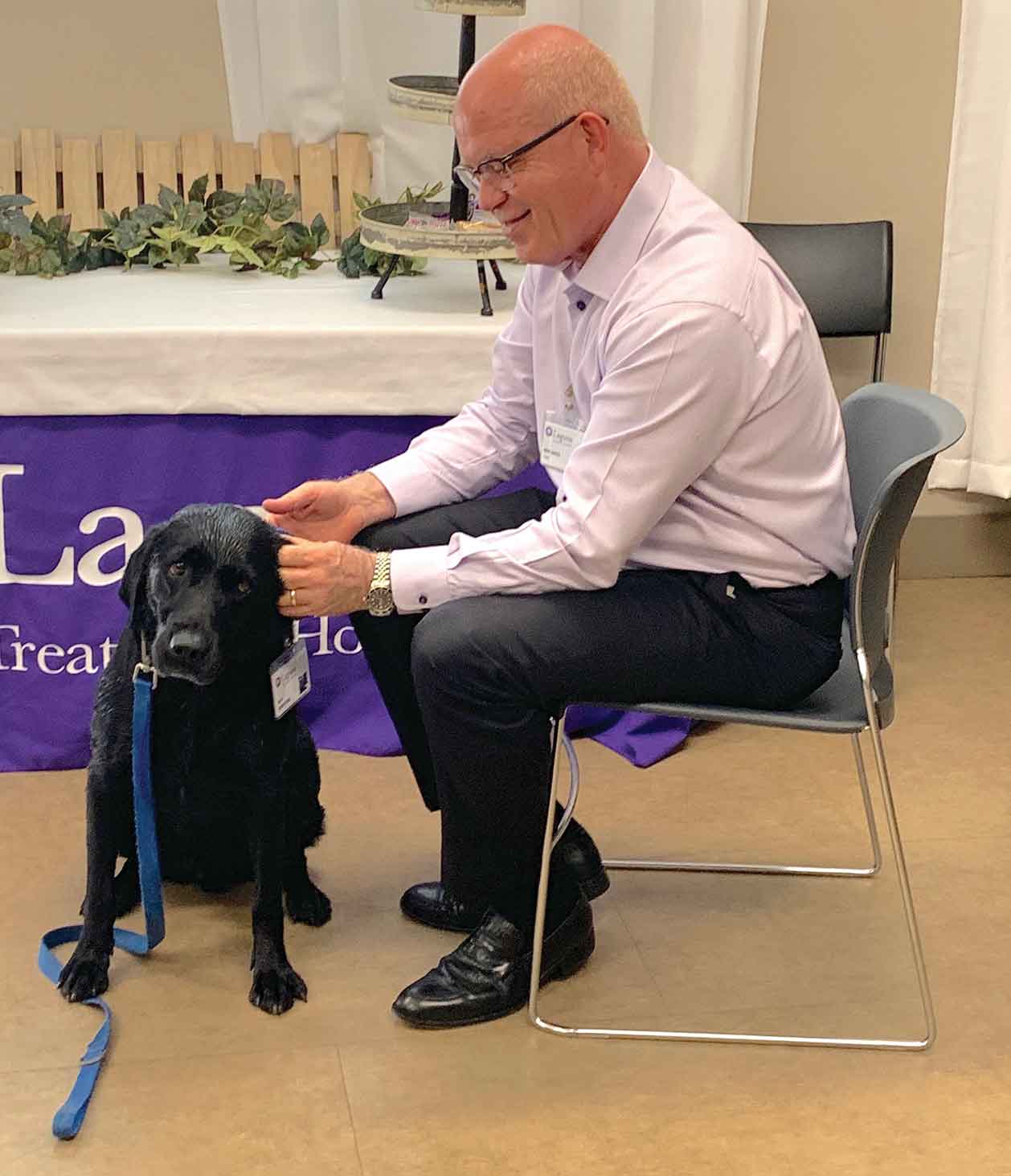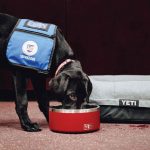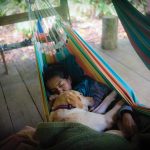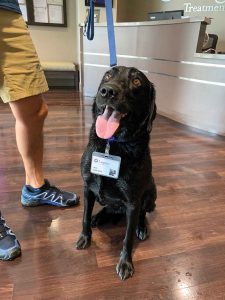
Jack is all smiles on the job at Laguna Treatment Hospital. Photo courtesy of American Addiction Centers
Detection dog at Laguna Treatment Hospital helps people in recovery stay sober
[dropcap]A[/dropcap]round the time James Cocco celebrated two years of sobriety, a very special dog came into his life. That’s when the California resident teamed up with Jack, a black Lab trained to detect eight different narcotics to help people in addiction recovery stay sober. He’d witnessed firsthand how dangerous it can be when clients at treatment facilities smuggled in drugs.
“When someone brings something into a facility, that’s a very big problem,” he said. “It’s not just that one client it jeopardizes – it’s everyone in there. And once you get derailed, there’s no guarantee that you’re ever going to get back on the rails.”
Jack learned to recognize the scent of drugs like heroin, cocaine, marijuana, and oxycodone at Falco K9 Academy, a training center for police and detection dogs in Yorba Linda, California. Cocco specifically requested a Lab instead of a German shepherd or malinois.
“I’ve had several Labs in my lifetime, and I just knew they were great sniffers, but also their dispositions are second to none,” he said. “I wanted a dog that would do his job but also bring a level of calm and comfort to the clients. These clients are going through a lot. Their lives are really changing, and it’s scary getting sober. I can attest to that.”
The two quickly bonded and now work several days a week at Laguna Treatment Hospital in Aliso Viejo, California. The recovery hospital supports people suffering from drug and/or alcohol substance use disorders, provid-ing withdrawal treatment and rehabilitation services and offering 93 beds for inpatient care.
When Jack alerts on contraband, he places his nose directly on the source of the scent, then sits and gives Cocco “a really goofy look.” The five-year-old Lab loves to work because he’s motivated by his favorite reward: getting to play with a tennis ball.
When they do sweeps of the hospital, Cocco makes a point of introducing Jack to new clients, encouraging them to pet him if they like, and letting them know he’s not a police officer. Knowing a detection dog visits several times a week is a deterrent to breaking the rules, yet non-threatening since Jack is so friendly. In fact, Cocco said seeing Jack can help some clients feel more normal and remind them of home.
He’s seen the Lab work his magic numerous times over the past three years while visiting Laguna Treatment Hospital. One powerful memory involved a young woman whom Cocco could not get to smile. In fact, the first several times he met her, she’d cower and walk away.
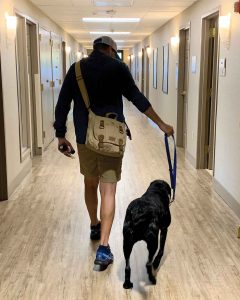
Jack and James Cocco search for contraband at Laguna Treatment Hospital. Photo courtesy of American Addiction Centers
“You could tell she was really in her own darkness, which is sort of common,” he recalled. “But probably on the fifth or sixth time there, she saw Jack coming down the hallway and she just stopped. I remember her eyes bulging out of her head. She got down on the ground and Jack kind of hugged her, and she hugged Jack. It was a very touching moment.”
Cocco thinks that was when a light bulb went off for the young woman and jumpstarted her recovery. “I don’t believe it was just Jack. She probably got to a point on her journey where she was just starting to the reap the fruits of her work, but something happened that day when she saw Jack,” he said. “From my standpoint, it brought her out of her shell.”
[dropcap]B[/dropcap]ob Hails, CEO of Laguna Treatment Hospital, said the most important part of recovery is getting clients to accept who they are so staff can meet them on their terms and help restore their confidence and self-esteem. Jack works toward that goal by helping clients relax.
“Jack is a source of joy – his tail never stops wagging,” he said. “People are going through some very dark times when they come to us. He puts a smile on their face when they haven’t smiled for a while… he’s like a beacon of positive light.”
Jack’s role in protecting clients has become even more critical lately with the rise of cheap, synthetic drugs like fentanyl, which is increasingly cut into heroin. “People are getting closer and closer to lethal dosages just to get high,” Hails explained. “What used to be our mission was to help people live a clean life; now we’re actually on the frontline of keeping people alive.”
Jack’s positive effect on people in recovery extends to his own handler. Cocco said he was struggling a little bit in his own sobriety when he brought Jack home. Now seven years sober, he credits the Lab with providing comfort and companionship to help him enjoy life on new terms. They love to take vacations in nature together.
“Jack is always up for an adventure,” Cocco said. “He never barks, he never complains, he’s always happy. He loves swimming – and it’s all about the ball, which is what makes him a great detection dog. He’s my buddy.”
Cocco said he’s grateful for the chance to help others through their recoveries while Jack continues to support him through his own.
“He’s an amazing dog to me. He definitely drives me and has made me a better person,” he said. “Jack has been a wonderful component to my own personal journey.”
For more information about Laguna Treatment Hospital, visit: LagunaTreatment.com. For a free consultation with American Addiction Centers, call their hotline: 866-53-SOBER. If you or someone you love is facing mental health and/or substance use disorders, call the U.S. Substance Abuse and Mental Health Services Administration’s free, confidential National Hotline at: 1-800-662-HELP.
Feature Image Top: Bob Hails and Jack spend time together. Photo courtesy of American Addiction Centers

